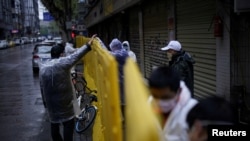As authorities lifted a two-month coronavirus lockdown in the central Chinese city of Wuhan, residents said they were growing increasingly skeptical that the figure of some 2,500 deaths in the city to date was accurate.
Since the start of the week, seven large funeral homes in Wuhan have been handing out the cremated remains of around 500 people to their families every day, suggesting that far more people died than ever made the official statistics.
"It can't be right ... because the incinerators have been working round the clock, so how can so few people have died?" an Wuhan resident surnamed Zhang told RFA on Friday.
"They started distributing ashes and starting interment ceremonies on Monday," he said.
Seven funeral homes currently serve Wuhan -- a huge conurbation of three cities: Hankou, Wuchang and Hanyang.
Social media users have been doing some basic math to figure out their daily capacity, while the news website Caixin.com reported that 5,000 urns had been delivered by a supplier to the Hankou Funeral Home in one day alone -- double the official number of deaths.
Some social media posts have estimated that all seven funeral homes in Wuhan are handing out 3,500 urns every day in total.
Funeral homes have informed families that they will try to complete cremations before the traditional grave-tending festival of Qing Ming on April 5, which would indicate a 12-day process beginning on March 23.
Such an estimate would mean that 42,000 urns would be given out during that time.
Various calculations
Another popular estimate is based on the cremation capacity of the funeral homes, which run a total of 84 furnaces with a capacity over 24 hours of 1,560 urns city-wide, assuming that one cremation takes one hour.
This calculation results in an estimated 46,800 deaths.
A resident of Hubei province, of which Wuhan is the capital, said most people there now believe that more than 40,000 people died in the city before and during the lockdown.
"Maybe the authorities are gradually releasing the real figures, intentionally or unintentionally, so that people will gradually come to accept the reality," the resident, who gave only his surname Mao, said.
A source close to the provincial civil affairs bureau said many people had died at home, without being diagnosed with, or treated for, COVID-19.
The source said any talk of the true number of deaths in Wuhan was very sensitive, but that the authorities do likely know the real figure.
"Every funeral home reports data on cremations directly to the authorities twice daily," the source said. "This means that each funeral home only knows how many cremations it has conducted, but not the situation at the other funeral homes."
The source said Wuhan saw 28,000 cremations in the space of a single month, suggesting that the online estimates over a two-and-a-half month period weren't excessive.
Wuhan resident Sun Linan said relatives of those who died are now forming long lines outside funeral homes to collect their loved ones' ashes.
"It has already begun," Sun said on Thursday. "There were people lining up in Biandanshan Cemetery yesterday, and a lot of people forming lines today at Hankou Funeral Home."
Hush money
Wuhan resident Chen Yaohui told RFA that city officials have been handing out 3,000 yuan in "funeral allowances" to the families of the dead in exchange for their silence.
"There have been a lot of funerals in the past few days, and the authorities are handing out 3,000 yuan in hush money to families who get their loved ones' remains laid to rest ahead of Qing Ming," he said, in a reference to the traditional grave tending festival on April 5.
"It's to stop them keening [a traditional expression of grief]; nobody's allowed to keen after Qing Ming has passed," Chen said.
The son of deceased COVID-19 patient Hu Aizhen said he had been told to collect his mother's ashes by the local neighborhood committee.
"The local committee told me they are now handling funerals, but I don't want to do it right now," the man, surnamed Ding, told RFA.
"There are too many people doing it right now."
Chen said nobody in the city believes the official death toll.
"The official number of deaths was 2,500 people ... but before the epidemic began, the city's crematoriums typically cremated around 220 people a day," he said.
"But during the epidemic, they transferred cremation workers from around China to Wuhan keep cremate bodies around the clock," he said.
A resident surnamed Gao said the city's seven crematoriums should have a capacity of around 2,000 bodies a day if they worked around the clock.
"Anyone looking at that figure will realize, anyone with any ability to think," Gao said. "What are they talking about [2,535] people?"
"Seven crematoriums could get through more than that [in a single day]."
Reported by Qiao Long for RFA's Mandarin Service, and by Lau Siu-fung for the Cantonese Service. Translated and edited by Luisetta Mudie.





